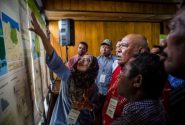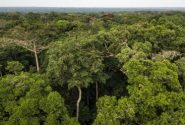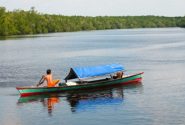
Debates over how to finance REDD+ — the U.N.-backed framework for reducing emissions caused by deforestation and forest degradation — and how to measure, report and verify carbon emissions, have been major sticking points in climate change negotiations. CIFOR/Kate Evans
BONN, Germany (20 June, 2013) – Concerns among developing countries about REDD+ “aid conditionality” — development aid payouts made based on achieving certain greenhouse gas (GHG) emissions reductions — are creating a barrier in international climate negotiations, a new report states.
A REDD+ Effectiveness Assessment should be established to verify emission reductions at a national level, so that targets are transparent and measurable, said Michael Dutschke, director of biocarbon consult, an international network for landscape management, climate and biodiversity, in his recent paper “Key issues in REDD+ verification”.
“Much technical work to do with forest monitoring systems and reporting emissions is put at risk by the disagreements related to reliable finance for REDD+ countries and to verification — issues that are intrinsically linked,” he said.
Debates over how to finance REDD+ — the U.N.-backed framework for reducing emissions caused by deforestation and forest degradation — and how to measure, report and verify (MRV) carbon emissions, have been major sticking points in climate change negotiations.
The original aim in 2007 was to fund the REDD+ program from carbon emissions trading, but with weak demand in carbon markets, most funding for the scheme, which is still in its early stages, comes from development aid budgets. This ties aid funds to results-based actions, which must prove that measurable improvements have been made, Dutschke said.
Verification has become a barrier in the negotiation process because it reminds negotiators from recipient countries of aid conditionality, which usually means aid is linked to the acquisition of goods and services from the donor country, he said.
Further complications of REDD+ financing will occur if there are no regulated verification procedures, limiting the potential for long-term predictable finance to help developing countries, according to the research paper.
Deforestation and forest degradation — mainly caused by agricultural expansion, converting forests to pastureland, infrastructure development and fires — account for 10 to 15 percent of all GHG emissions, more than the entire global transportation sector and second only to the energy sector.
Carbon markets are intended to open the door for investments in emission-reduction in developing countries. However, most of the $17.2 billion funding pledged for projects to protect standing forests has been contributed to developing countries through aid.
The funds are meant to create and support strategies for REDD+ climate change mitigation efforts based on country-specific causes of deforestation, Dutschke said.
Under the U.N. Framework Convention on Climate Change (UNFCCC), developed countries produce reports on atmospheric emissions and removals from land-use related activities and forestry.
For their own interest, developing countries should be expected to adhere to a system for monitoring MRV emissions and removals, Dutschke said.
Bilateral and even multilateral REDD+ funding is subject to legal agreements between the parties involved and usually includes MRV procedures, he said, whereas international funding under the UNFCCC will be regulated by an internationally binding mechanism.
Unless verification and other solid accounting principles are agreed upon, funding for REDD+ risks becoming more fragmented.
For more information on the issues discussed in this article, please contact Michael Dutschke at michael@biocarbon.net
This research is part of the Global Comparative Study on REDD+, which forms part of the CGIAR Research Program on Forests, Trees and Agroforestry. It is supported by the Norwegian Agency for Development Cooperation, AusAid, the UK Department for International Development and the European Commission.
We want you to share Forests News content, which is licensed under Creative Commons Attribution-NonCommercial-ShareAlike 4.0 International (CC BY-NC-SA 4.0). This means you are free to redistribute our material for non-commercial purposes. All we ask is that you give Forests News appropriate credit and link to the original Forests News content, indicate if changes were made, and distribute your contributions under the same Creative Commons license. You must notify Forests News if you repost, reprint or reuse our materials by contacting forestsnews@cifor-icraf.org.












